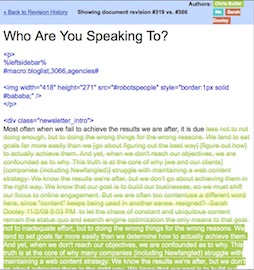Everybody at Newfangled has a superpower. Mine is baking pies:
 But
But
if I were going to choose something a little more practical (which goes
against the point of a superpower), I would point to my secret identity
as a grammar nerd. Before coming to Newfangled, I majored in English,
taught freshman composition, and tutored in a writing center. Working
at a place where a lot of writing takes place, I end up doing a fair
amount of editing. Chris has recently provided a lot of good advice on professional writing; this is my take on another side of the process.
The
common understanding of what English majors do tends to involve a lot
of punctuation–“Uh-oh! I better watch my grammar!” was a popular
comment when I used to introduce myself as a writing teacher. I do
happen to be a punctuation fan, but that kind of stuff was actually a
very minor part of any of my previous roles; instead, the writing
program where I taught focused on upper-level concerns like introducing
students to college-level work and teaching them how to revise their
writing. One of the things we stressed was that what many students
thought of as editing–checking the commas, basically–was just the
last, and in some ways the least important, stage of a bigger process.
Not
every piece of professional writing you do will involve the same steps
I used to put my freshmen through. But there are three general stages
of revision that will probably come into play in some form for most of
the writing you do. They can be characterized as:
1. Editing
At
this stage, the focus should be on the big picture. What are you really
saying? How are you engaging your audience? How is your piece
structured? Until you’ve got that kind of stuff figured out, it’s not
worth getting too hung up on the commas.
2. Copyediting
Once
you’ve got the ideas in place and structured the way you want them, you
can start focusing more on the wording. Your draft will probably have
some unclear patches where you weren’t sure what you wanted to say
until after you had said it; now that you know, this is the time to
clean it up.
3. Proofreading
Here’s the part where you
make sure everything is ready for presentation. Run spellcheck (but
don’t assume it knows everything), and yes, clean up those commas.
If
you find yourself asked to help a colleague with some writing–good for
you! You must have gotten a reputation as a grammar nerd yourself. In
that case, one of the most important things I would recommend
(especially if it’s the first time this person has enlisted you as an
editor) is taking some time up front to find out where in the revision
process your writer is. Whereas all the students in my composition
classes were supposed to be on the same trajectory, real-world writers
may seek out help at any stage, and that can determine what editing
approach will be effective. If it’s early on, and your colleague is
trying to use you as a sounding board for ideas, there’s not much point
going through and fixing the spelling; the words are likely to change
several times anyway. In that situation, it may be more helpful for you
to ask questions that help focus the argument, or point out places
where an idea could be developed more. On the other hand, sometimes the
last-minute comma check is exactly what’s needed; in those cases,
making structural suggestions may just cause frustration about issues
there isn’t really time to address.
The editing I do at
Newfangled falls at all points of this range. Most frequently, I’ll get
a question along the lines of “How does this sentence look?”. I’ll say,
“Looks good!” or “Take out the comma,” and that’s that.
 Less frequently but more consistently, I edit the Newfangled newsletter
Less frequently but more consistently, I edit the Newfangled newsletter
each month before it goes to press. Several factors make this process
different than a one-off sentence or paragraph correction:
-I’m
working with an entire document rather than just an isolated section.
Seeing the big picture gives me the chance to make general structural
suggestions or get a better sense of the overall tone.
-I get the
draft a little in advance of the publish date, which makes it possible
to address those kinds of upper-level issues when needed. There’s time
to sit down and talk through any points that are unclear.
-I’m working with the same writer
every month, which has allowed me to develop a sense of what kinds of
feedback will be useful. For instance, the introduction is often one of
the last things written (which is a very common writing strategy and is
generally the approach I would recommend), so it’s usually a key topic
of discussion.
Because my background is in teaching rather than
commercial editing, the editing style I’ve learned focuses heavily on
getting people to develop and express their own ideas. One of my
tendencies as an editor is therefore to want the writer to do the
rewriting, rather than swooping in with a red pen and doing it all
myself. The earlier in the revision process, the stronger that tendency
is. If I find an idea unclear, I’ll usually ask questions about it that
lead to a discussion about ways the writer can clarify; if the wording
is unclear in a certain spot, I’ll write out an alternate wording or
two but leave it up to the writer to choose which to use; if I see a
misspelling or punctuation error, I’ll usually just take care of it.
Again, how appropriate this hands-off style is depends on the
situation. I like that it allows authors to retain a sense of
intellectual ownership over their writing and to know the final product
still feels like their voice. (Ending up with a document that doesn’t
sound like me is one of the things I want to avoid when getting my own
writing edited.) On the other hand, it would probably be good for me to
develop more comfort with just jumping in and taking care of everything
when the situation calls for it.
What about you–do you
collaborate on writing, either as an author or an editor? If you seek
out editing for your writing, what kinds of responses do you find
helpful? If you tend to be the one doing the editing, how do you
approach the situation?


